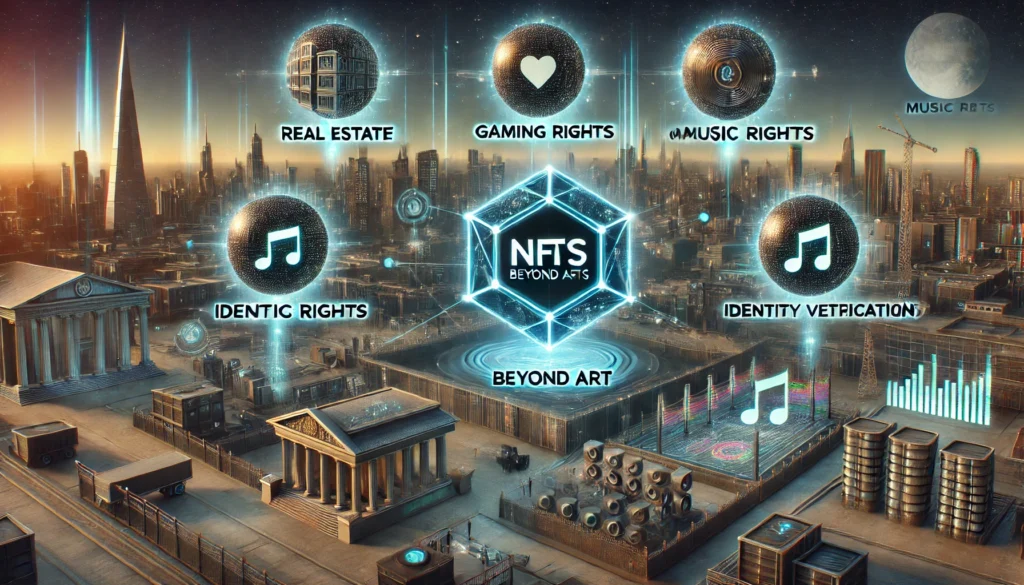NFTs Beyond Art: Real-World Use Cases in 2025
When you hear “NFTs,” you probably think of million-dollar digital art and pixelated apes. But let’s be real—NFTs are way bigger than just collectibles. In 2025, these blockchain-powered assets are transforming industries you might not even expect. From real estate to healthcare, NFTs are solving real-world problems and making life more efficient.
So, let’s dive deep into how NFTs are revolutionizing multiple sectors and why they matter more than ever.

Table of Contents
1. Real Estate: Buying Property on the Blockchain
Imagine buying a house without the mountains of paperwork, lengthy verification processes, and expensive legal fees. With NFTs, real estate transactions are becoming faster, more transparent, and highly secure. Each NFT represents property ownership, recorded on a blockchain—meaning no disputes, no fraud, and full transparency.
Companies like Propy are already making this a reality, allowing users to buy and sell real estate as NFTs. The concept of fractional ownership is also gaining traction, enabling multiple investors to own shares of high-value properties through NFTs.
2. Gaming: True Digital Ownership & Play-to-Earn
Gamers are tired of spending thousands on in-game items they don’t truly own. Enter NFTs. With blockchain-backed gaming, players now have full ownership of their skins, weapons, and characters. This means they can buy, sell, and trade these assets freely, even outside the game.
Games like Axie Infinity, Illuvium, and The Sandbox have pioneered the play-to-earn model, where players can monetize their gaming efforts. This shift is creating new economic opportunities, turning gaming into a legitimate source of income for many.
3. Supply Chain & Logistics: Transparency & Efficiency
Ever wondered where your coffee beans actually come from? NFTs are helping consumers verify product authenticity and track supply chains in real time.
Companies like VeChain use NFTs to provide proof of origin for goods, ensuring ethical sourcing and reducing fraud. This is a game-changer for industries like luxury fashion, food, and pharmaceuticals, where authenticity and traceability are crucial.
4. Healthcare: Secure & Portable Medical Records
Managing medical records has always been a nightmare—lost files, outdated data, and privacy concerns. NFTs are revolutionizing this space by enabling secure, immutable, and portable health records. Patients can control their own medical history, granting access to doctors only when needed.
This improves patient care, ensures data privacy, and eliminates inefficiencies in medical record management. Healthcare providers can also use NFTs to track the supply chain of pharmaceuticals, reducing counterfeit drugs in the market.
5. Music & Entertainment: Empowering Artists
Musicians have long struggled with middlemen taking a big cut of their earnings. With NFTs, artists can sell music directly to fans, ensuring they get paid fairly. Platforms like Royal and Audius allow musicians to tokenize their work, offering exclusive content and even royalty-sharing opportunities to fans.
Beyond music, film and television creators are also using NFTs to fund projects, distribute exclusive content, and engage audiences in new ways.
6. Identity & Credentials: Digital Passports & Certifications
Fake diplomas and identity theft are huge problems in today’s digital world. NFTs provide a foolproof way to verify credentials, whether it’s university degrees, professional certifications, or even government IDs.
Universities and institutions are already issuing NFT-based diplomas, making it easier for employers to verify qualifications instantly. This shift could eliminate resume fraud and streamline hiring processes worldwide.
7. Event Ticketing: No More Scalpers & Fake Tickets
If you’ve ever been scammed by fake tickets or dealt with outrageous reseller prices, you’ll love NFT ticketing. Event organizers are now using NFTs to issue tickets, preventing counterfeits and ensuring fair pricing.
Major concerts, sports events, and festivals are already shifting to blockchain-based ticketing, creating a more secure and seamless experience for attendees.
8. Luxury Goods & Fashion: Verifiable Authenticity
Luxury brands are leveraging NFTs to verify the authenticity of high-end goods. Each NFT acts as a digital certificate of authenticity, proving the ownership and legitimacy of items like designer bags, watches, and sneakers.
Brands like Gucci and Louis Vuitton are already exploring NFT integration, ensuring that customers get genuine products while combating counterfeiting.
10. Government & Public Services: Secure Voting & Governance
Governments are experimenting with NFTs to improve public services. From digital identity verification to secure voting systems, blockchain technology ensures transparency and security in governance.
Countries like Estonia are leading the way with blockchain-based e-governance solutions, setting the stage for broader adoption worldwide.
Final Thoughts: NFTs Are Just Getting Started
NFTs aren’t just a trend—they’re a full-fledged revolution. While digital art brought them mainstream attention, the real value lies in their ability to verify ownership, streamline transactions, and cut out unnecessary middlemen.
As we move deeper into 2025, NFTs will continue to reshape industries, creating more transparency, efficiency, and opportunities for users worldwide. Whether you’re a gamer, a business owner, or an investor, now’s the time to pay attention—because the NFT wave is far from over.